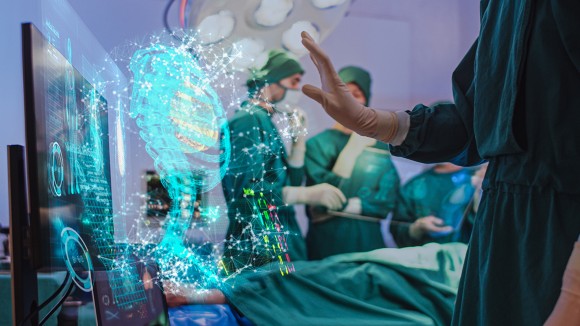 Michael D. Abramoff, MD, PhD, Fellow, IEEE, is a neuroscientist, computer engineer and fellowship-trained retina specialist. As the Watzke Professor of Ophthalmology at the University of Iowa, he has authored over 300 peer-reviewed publications, is an inventor on 17 issued patents, and has been cited over 35,000 times. As expert on AI in healthcare, and AI ethics, he has briefed the US Congress, the White House, the U.S. Food and Drug Administration (FDA) and the Federal Trade Commission (FTC), and chairs the Foundational Principles of Ophthalmic Imaging Algorithmic Interpretation workgroup, originally instituted by FDA. In 2010, Dr Abramoff’s research findings led him to found Digital Diagnostics - the first company ever to receive FDA clearance for an autonomous AI diagnostic system. Digital Diagnostics has a focus on developing clinically aligned autonomous AI systems. By enabling diagnostic assessment in primary care settings, Digital Diagnostics aims to increase patient access to high-quality, affordable disease detection and healthcare solutions. Dr Abramoff has been an Editorial Board Member for Scientific Reports since 2014.
Michael D. Abramoff, MD, PhD, Fellow, IEEE, is a neuroscientist, computer engineer and fellowship-trained retina specialist. As the Watzke Professor of Ophthalmology at the University of Iowa, he has authored over 300 peer-reviewed publications, is an inventor on 17 issued patents, and has been cited over 35,000 times. As expert on AI in healthcare, and AI ethics, he has briefed the US Congress, the White House, the U.S. Food and Drug Administration (FDA) and the Federal Trade Commission (FTC), and chairs the Foundational Principles of Ophthalmic Imaging Algorithmic Interpretation workgroup, originally instituted by FDA. In 2010, Dr Abramoff’s research findings led him to found Digital Diagnostics - the first company ever to receive FDA clearance for an autonomous AI diagnostic system. Digital Diagnostics has a focus on developing clinically aligned autonomous AI systems. By enabling diagnostic assessment in primary care settings, Digital Diagnostics aims to increase patient access to high-quality, affordable disease detection and healthcare solutions. Dr Abramoff has been an Editorial Board Member for Scientific Reports since 2014.
 Nicholas Furnham is an Associate Professor at the London School of Hygiene & Tropical Medicine, UK. His research aims to addresses important questions relating to infectious disease including antimicrobial resistance and the development of therapeutic interventions. To address these questions, his research group uses an interdisciplinary approach combining biology and chemistry with computer science (including machine learning and AI) to develop new algorithms and bioinformatics tools through large-scale integrative data processing. Dr Furnham has been an Editorial Board Member for Scientific Reports since 2019.
Nicholas Furnham is an Associate Professor at the London School of Hygiene & Tropical Medicine, UK. His research aims to addresses important questions relating to infectious disease including antimicrobial resistance and the development of therapeutic interventions. To address these questions, his research group uses an interdisciplinary approach combining biology and chemistry with computer science (including machine learning and AI) to develop new algorithms and bioinformatics tools through large-scale integrative data processing. Dr Furnham has been an Editorial Board Member for Scientific Reports since 2019.
 Reiko Tanaka is Reader in Computational Systems Biology & Medicine in the Department of Bioengineering at Imperial College London, UK. Her research interests include mechanistic understanding of disease pathogenesis towards personalised medicine for allergic disease such as eczema and asthma, using tools from systems and control engineering and machine learning. She is a member of the AI working group party at the British Association of Dermatologists. Dr Tanaka has been an Editorial Board Member for Scientific Reports since 2017.
Reiko Tanaka is Reader in Computational Systems Biology & Medicine in the Department of Bioengineering at Imperial College London, UK. Her research interests include mechanistic understanding of disease pathogenesis towards personalised medicine for allergic disease such as eczema and asthma, using tools from systems and control engineering and machine learning. She is a member of the AI working group party at the British Association of Dermatologists. Dr Tanaka has been an Editorial Board Member for Scientific Reports since 2017.

